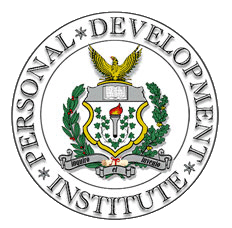Personal Development Institute Guidelines
PDI
Advisor -
PDI
Chapter
"We believe Individuals should not be pushed from
behind, but rather pulled ahead by their own Aspirations".
Advisor Team Philosophy
The Greek philosopher Socrates taught his students by
asking them questions and then pointing out the contradictions in their
answers. This same method plays a prominent role in the advisors'
disciplines.
The Goal
Each coaching session has three general goals: first, to
determine the participants objective; second, to uncover any barriers to
timely and cost effective achievement of those objectives; third, to
overcome the barriers.
What do we mean by Barriers?
One way to look at barriers to your personal
development objectives is to
think of them as contradictions. You may be contradicting yourself by not doing what
you are supposed to do. In this light, serving
you means helping you correct these contradictions.
Top
PDI Meeting Guidelines
The meetings serve as forums for discussing issues related to self-inquiry
and self-definition. This is a tricky proposition -- using the mind to
understand the mind. To expedite the process, a PDI Advisor directs the
discussion.
Typical meeting formats are round-robin style, where participants have an
equal amount of time to air their views. The object of this airing is to help
each person clarify contradictions, tracing them back to prides and fears that
cloud our mental processes. One of the ways of doing this is a friendly mode of
challenging, or confrontation, not of the person but of his or her
assumptions, beliefs, values and ethics. The Advisor is not to be
confronted, as this disrupts the flow of the meeting.
A successful interchange relies on the cooperation of all participants and
their willingness to "play the game." No one should preach or be
subject to preaching. As much as is humanly possible we should try to:
- Listen actively, without interrupting, maintaining a felt connection with
the speaker.
- Keep the focus on each participant in turn, avoiding the temptation to
shift the attention to ourselves -- either out of a desire to rescue the
person from tension or a desire to be the center of attention ourselves.
When such a shift occurs, the facilitator or other participant should point
it out.
- Try to understand the speaker's point of view and challenge him to
question his own thinking, not argue with him or try to sell our views.
Insight Workshops
Generally, on alternate weekends, to strengthen
the bonds of friendship and stimulate self-inquiry. We employ a variety of
techniques including writing, meditation, and questioning each other regarding
the previous discussion and other topics. Other activities include
viewing and discussing videotapes and going on outings.
A meal (costs to be shared if served in someone's home) and socializing often
follow the informally-structured session. A $1 donation is requested of
participants in the discussion meetings and weekend workshops to help defray the
cost of materials, refreshments, and Chapter Membership dues.
Top
| 